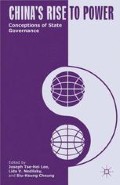Abstract
During the early 1980s, the People’s Republic of China faced a double crisis of legitimacy. The degeneration of society into violent ideological factionalism during the lost decade of the Cultural Revolution (1966–1976) appeared to render bankrupt the revolutionary ideals by which the Chinese Communist Party had defined itself. At the same time, the post-Mao market reforms called into question the socialist principles to which the party claimed adherence. These two issues of collective trauma and ideological vacuity required the party’s involvement in a national project of political healing, reconciliation, and reconsolidation.
Access this chapter
Tax calculation will be finalised at checkout
Purchases are for personal use only
Preview
Unable to display preview. Download preview PDF.
Bibliography
Chen Min. 1986. “Wo yu wenshi gongzuo—fang Du Jianshi [My Work with the Literary and Historical Materials’ Project—Interview with Du Jianshi].” Liaowang [Observer] 13.
Chen Peng. 2002. “Dui lishi fuze, dui houren fuze: quanguo zhengxie wenshi ziliao ‘qingku’ jishi [Being Responsible toward History, being Responsible toward the Next Generation: Report on Cleaning out the Archives for the Literary and Historical Materials’ Project of the National People’s Political Consultative Conference].” Shidao chao [Chinese Times], no. 7, 12–13.
Chen Qisi. 1994. “Shi nian wenshi, shi nian gong—enping shi wenshi gongzuo jisheng [Ten Years of the Literary and Historical Materials’ Project, Ten Years of Good Deeds—Commemorating Enping’s Wenshi Work].” Tongzhou gongjin [Common Destiny] 9.
Christoffersen, Gaye. 2002. “The Political Implications of Heilongjiang’s Industrial Structure.” In John Fitzgerald, ed. Rethinking China’s Provinces, 221–246. New York: Routledge.
Gottschang, Thomas, and Diana Lary. 2000. Swallows and Settlers: the Great Migration from North China to Manchuria. Ann Arbor: Center for Chinese Studies, University of Michigan.
Heilongjiang shengwei zhengzhi yanjiu shi [Heilongjiang Provincial Political Studies Office]. 1965. “Sha’E bazhan jiangdong liushisi tun qianqian houhou [The History of Czarist Russia’s Seizure of the Sixty-Four Villages East of the River].” Xuexi yu tansuo [Study and Inquiry].
Kwong, Luke S. K. 1992. “Oral History in China: A Preliminary Review.” The Oral History Review 20, no. 1/2, 23–50.
Larin, Viktor. 1995. “ ‘Yellow Peril’ Again? The Chinese and the Russian Far East.” In Stephen Kotkin and David Wolff, eds. Rediscovering Russia in Asia: Siberia and the Russian Far East, 290–301. Armonk, NY: M. E. Sharpe.
Lattimore, Owen. 1975. Manchuria: Cradle of Conflict. New York: AMS Press.
Liu Wenfeng. 1901. Dongchui jixing [Travels to the Eastern Frontier]. No publication details given.
Luo Chunpu. 2001. “Shanxi piaohaoye de jinrong chuangxin [Financial Innovations of the Shanxi Credit Industry].” Jinyang xuekan [Academic Journal of Jinyang], no. 5, 57.
Mitter, Rana. 2000. “Behind the Scenes at the Museum: Nationalism, History and Memory in the Beijing War of Resistance Museum, 1987– 1997.” The China Quarterly, no. 161, 279–293.
Shen Yunlong. 1987. Jindai Zhongguo shiliao congkan [Compendium of Historical Materials on Modern China], vol. 3, no. 52. Taibei: Wenhai chubanshe yingyin.
Tucker, David. 2005. “City Planning without Cities: Order and Chaos in Utopian Manchukuo.” In Mariko Asano Tamanoi, ed. Crossed Histories: Manchuria in the Age of Empire, 53–81. Honolulu, HI: Association for Asian Studies and University of Hawaii Press.
Wakerman, Jr., Frederick E. 2009. Telling Chinese History: A Selection of Essays. Berkeley: University of California Press.
Waldron, Arthur. 1996. “China’s New Remembering of World War II: The Case of Zhang Zizhong.” Modern Asian Studies 30, no. 4, 945–978.
Wang Zheng. 2008. “National Humiliation, History Education, and the Politics of Historical Memory: Patriotic Education Campaign in China.” International Studies Quarterly 52, 783–806.
Wright, Tim. 1993. “ ‘The Spiritual Heritage of Chinese Capitalism’—Recent Trends in the Historiography of Chinese Enterprise Management.” In Jonathan Unger, ed. “Using the Past to Serve the Present”: Politics and Historiography in Contemporary China, 205–238. Armonk, NY: M. E. Sharpe.
Wu Jiahu. 2007. “Jindai huabei xiangcun renkou de liudong qianyi [Movement of the Rural Population of Northern China in Recent History].” Zhongguo nongye daxue xuebao—Shehui kexue ban [Journal of Chinese Agricultural University—Social Sciences Edition] 24, no. 1, 76.
Xu Chengbei. 2000. “Wenshi san ti [Three Points Regarding Literary and Historical Materials].” Beijing guancha [Beijing Observation], no. 8.
Yang Chengwu. 1986. “Zhengxie wenshi gongzuo huigu yu zhanwang [Looking Backward and Forward at the Literary and Historical Materials’ Project of the National People’s Political Consultative Conference].” Liaowang [Observer], no. 13.
Yin Xingwen, Jin Baichuan, and Liu Qingqi. 1984. “Hailanpao da tusha jianwen [First-hand Accounts of the Blagoveshchensk Massacre].” Heilongjiang wenshi ziliao [Heilongjiang Literary and Historical Materials], no. 12, 117–118.
Zatsepine, Victor. 2011. “The Blagoveshchensk Massacre of 1900: The Sino-Russian War and Global Imperialism.” In Norman Smith and James Flath, eds. Beyond Suffering: Recounting War in Modern China, 107–129. Vancouver: University of British Columbia Press.
Zhang Pengxiang, and Tao Zongqi. 1933, Reprinted in 1968. Changli xianzhi [Changli County Gazetteer], no. 5, 429–430. Taibei: Chengwen chubanshe.
Zhang Tong. 1984. “Ershi niandai shouhui zhongdong tielu bufen liquan shi shulue [A Brief Historical Account of the Partial Recovery of Rights on the Chinese Eastern Railway].” Harbin shizhi [Harbin History and Gazetteer], no. 1, 23–32.
Zhang Yin. 2001. “Dui canyu zhengji wenshi ziliao gongzuo de yidian ganshou [Some Reflections on My Participation in Collecting Literary and Historical Materials].” Guiyang wenshi [Guiyang Literary and Historical Materials], no. 2.
Editor information
Copyright information
© 2012 Joseph Tse-Hei Lee, Lida V. Nedilsky, and Siu-Keung Cheung
About this chapter
Cite this chapter
Fromm, M. (2012). Invoking the Ghosts of Blagoveshchensk: Massacre, Memory, and the Post-Mao Search for Historical Identity. In: Lee, J.TH., Nedilsky, L.V., Cheung, SK. (eds) China’s Rise to Power. Palgrave Macmillan, New York. https://doi.org/10.1057/9781137276742_7
Download citation
DOI: https://doi.org/10.1057/9781137276742_7
Publisher Name: Palgrave Macmillan, New York
Print ISBN: 978-1-349-44678-0
Online ISBN: 978-1-137-27674-2
eBook Packages: Palgrave Political & Intern. Studies CollectionPolitical Science and International Studies (R0)

